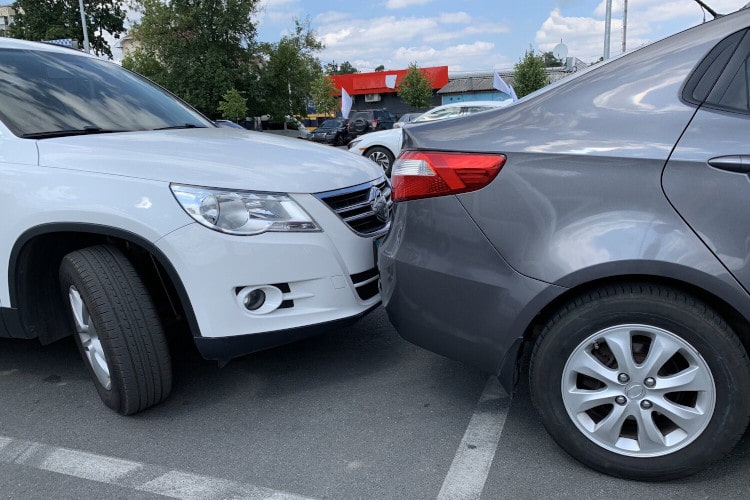Parking lots are busy areas, often packed with vehicles, shopping carts, and pedestrians, which makes them a prime location for fender benders.

The parking lot 50/50 myth
There is a popular myth that if two cars crash in a parking lot, both drivers are deemed equally at fault, regardless of who was doing what when the accident occurred.
Is this true?
Even though many motorists believe this is true, the 50/50 parking lot myth is just that, a myth. All motorists are accountable for careless driving, regardless of where an accident happens. If you collide with another vehicle, whether that other vehicle is parked or travelling through the parking lot, you will be held responsible for your portion of liability in the accident.
What if the myth was true?
If this urban legend were true, and all car accidents in a parking lot had 50/50 liability, the impacts would be far-reaching for both motorists and insurance companies. Would people still drive carefully if motorists were not held accountable for their driving in a parking lot?
As much as one would like to believe that motorists would drive carefully regardless of where they are, that’s not always the case. The National Safety Council found that 66% of drivers in the United States said they would make phone calls while driving through parking lots, with more than 50% saying they would text or use social media. Insurance companies caution their customers that their rates could increase if there appears to be a history of no-fault accidents on the driver’s record.
And what if motorists don’t drive with care in parking lots? Where does that leave the insurance company? A simple answer is that insurance premiums would inevitably rise, becoming unaffordable for some motorists.
What types of accidents happen in a parking lot?
There are several different ways accidents happen in parking lots. For example, a driver can pull forward through a space and onto the roadway hitting another vehicle, two cars can collide while vying for the same parking spot, or a vehicle may collide with a pedestrian. The possibilities are extensive, so being alert and cautious is the only way to help prevent these accidents.
How is fault determined in a parking lot accident?
Auto insurance companies and lawyers use fault determination rules to help determine who is at fault for a car accident in various traffic scenarios. In a parking lot accident, there are two important things to remember:
- Drivers travelling on the main roads or sections have the right of way over other drivers travelling elsewhere in the parking lot (the feeder lanes). The collision-causing driver who fails to yield the right of way to a driver travelling along the parking lot’s main thoroughfare is 100% to blame for an accident.
- Any driver who tries to leave a parking space and fails to yield the right of way to a passing driver and causes an accident is 100% to blame for the collision.
From the courts
The following are examples of parking lot accident court rulings in Atlantic Canada where fault was determined not to be 50/50.
In the 2016 Newfoundland & Labrador case Best v. Penney, Mr. Penney was solely liable for an accident when he backed into a vehicle that had stopped while backing out of another parking spot. The evidence showed that Ms. Best’s vehicle was already in the driving lane and had completely stopped when Mr. Penney hit it.
In the 1994 Nova Scotia case Dorie v Williams, Mr. Williams backed out of a parking space using his side mirrors as a guide, colliding with a vehicle driving slowly in the traffic lane. Mr. Williams was found solely liable for causing the accident.
Parking lot safety rules
If you’re in a parking lot, drive with care. It is important to follow the rules of the road while in a parking lot.
- Obey traffic signs and speed limits
- Yield to oncoming traffic
- Use turn signals
- Give the right of way to drivers that are already in the roadway before exiting your spot
- Be vigilant when reversing your vehicle and opening your doors, ensuring you give yourself and other vehicles enough room.
If you have technology in your vehicle that helps detect when other vehicles are close to yours, that can be a helpful tool. Use your mirrors, do shoulder checks frequently, and, if you can, back into a parking space or find one you can drive straight through.
What should I do if I end up in an accident in a parking lot?
If you find yourself injured in a collision in a parking lot, there are steps you should take to protect yourself.
- Don’t assume or place blame, and don’t apologize because doing so can be taken as an admission of fault.
- Assess the damages to both vehicles, take pictures, and jot down details of the event as it occurred, including things like the time of day, how the accident occurred, and the road conditions.
- Exchange insurance and contact information with the other driver.
- Collect contact information for any witnesses.
- In Alberta, Nova Scotia, and Ontario, a police report is required when the combined damage to both vehicles exceeds $2,000. In most other provinces, you don’t have to report an accident if it is less than $1,000 worth of damage.
- Do not leave the scene of an accident if you hit a parked car. It is a criminal offence and can be punishable by imprisonment. If you cannot find the driver, leave a note with your name, phone number, driver’s license number, and license plate information.
- Contact your insurance company immediately.
- If you feel any pain or suspect an injury, go to the hospital or visit your doctor as soon as possible, documenting all visits, any diagnosis, and treatments resulting from the accident.
Request a
Free Consultation
If you would like to learn your legal options at no obligation, contact us today to set up a free consultation.
